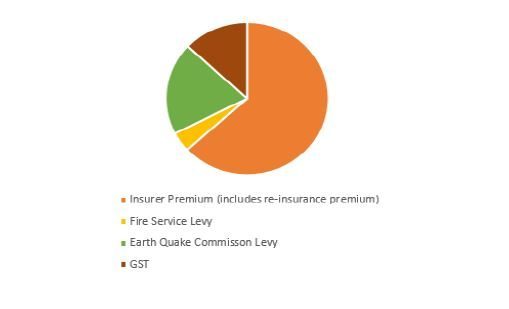
Important House Insurance Changes
By law, Insurers are obliged to collect government levies (or fees) on most insurance policies on behalf of the government for certain natural disasters and for fire and emergency services
- Earthquake Commission (EQC) levy – the EQC levy funds a government insurance (called EQCover) and it’s there to support all New Zealanders if there’s certain natural disasters. Everyone pays the levy through their house or landlord insurance so EQC can be ready to help if something major happens.
- Fire & Emergency New Zealand (FENZ) levy – the FENZ levy is paid through car, contents and house insurance. This levy contributes to New Zealand’s fire and emergency services.
From 1 October 2022, EQC will cover up to $300,000 plus GST of damage per residential unit caused by earthquakes, tsunamis, volcanic eruptions, hydrothermal activity, and natural landslips. This, along with several other factors, will affect the insurance premiums that you pay for home insurance.
This change will take effect for each home insurance customer at their next policy renewal, on or from 1st October 2022.
What’s changing
- The EQC cap will rise from $150,000 to $300,000.
- The EQC levy collected by insurers is changing from 20 cents per $100 (+ GST) capped at a maximum of $345 (including GST), to 16 cents per $100 (+ GST) to a maximum of $552 (including GST).
- We have No control over these Statutory charges and the payments are passed directly to the EQC and Fire service via insurance companies.
- Home rate changes will also be delivered in conjunction with EQC cap and levy changes as a consequence of covid, supply chain issues, claims and economic factors.
What this means for you
- You will receive increased cover from EQC.
Impact on pricing
- The EQC Cap and Levy change will affect the insurance premiums that you pay for home insurance and impacted commercial property policies.
- The EQC cap change will see an increase in the EQC levy with customers facing an increase of up to $207 (inc. GST) per dwelling (depending on the sum insured). This will impact residential customers, commercial property customers with residential dwellings, and multi-dwelling residential buildings that are eligible for EQC cover.
Impact on home insurance premiums
- There will be variations in the changes to home insurance premiums by location as a result of EQC changes depending on the level of natural hazard risk.
- Changes to the EQC Cap and Levy are not the only thing affecting the cost of house insurance this year. Prices will also be impacted by the indexation of sums insured, claims inflation, and
- increases in natural peril losses. These prices vary between insurers.
- We are continuing to work through the combined impacts of these changes to our customers and will be making recommendations accordingly.
How insurance premium is made up

NB: This is based on an average house premium
Ways to reduce your premiums
Protecting your property is important, so if you’re feeling stretched, there are ways to lower your premium while staying insured.
Insurance premiums are reviewed and calculated each year to account for any changes to the cost of providing cover.
- House Insurance. Know the total cost to rebuild your home, perhaps you are underinsured or overinsured. To help you get a more accurate sum insured, check your sum insured amount. Visit the CoreLogic website for an estimate
- Is your property alarmed? Let your insurer know if it is as this could save you premium
- Car Insurance. Ensure that your details are correct as every little thing can have an affect on your premium, like the kind of car you own, sum insured, where you live and other personal details
- Consider Voluntary Excesses
Available Options
- Be aware that some insurers offer such things as matching carpets or glass cover with a nil excess. If this is important to you, please contact us.
- Landlords cover – if you are a landlord please be aware of your obligations such as regular inspections plus rent and bond collection. There is also an optional extension that can be provided to protect you for malicious damage or loss of rent. If this is important to you, please contact us
- Premium payment options are available to ease cash flow
Other Interesting Facts
- Reinsurance – Everyone needs insurance – even insurance companies. Reinsurance is protection for insurance companies. It provides specialist insurance to help cover the cost of claims if there’s a major disaster, like an earthquake or flood.
- Crazy fact – according to Lloyds of London, New Zealand is the second most vulnerable country to Natural Disaster after Bangladesh
- Remember all of New Zealand is being affected by the changes that are occurring, even ourselves, so please contact us, we understand, and will work alongside you to come to a suitable solution.
